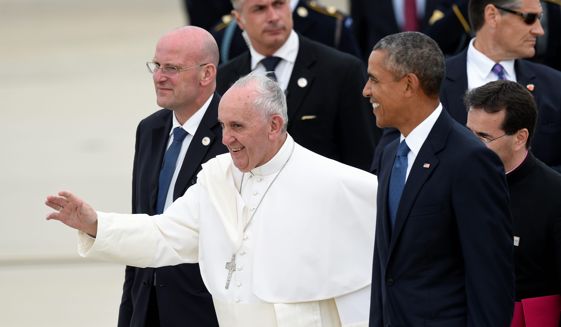The Pope, the President and Religous Diversity
By Mark Rienzi
WashingtonTimes.com

Pope Francis, center, walks with President Barack
Obama, right, after arriving at Andrews Air Force
Base in Md., Tuesday, Sept. 22, 2015. The Pope is
spending three days in Washington before heading to
New York and Philadelphia. (AP
Photo/Susan Walsh)
When he arrived in Maryland on Tuesday, Pope Francis touched down not far from the spot where some of America’s first Catholics arrived nearly 400 years ago. Those early Catholic settlers arrived with none of the fanfare that greeted the pope. But they helped establish a quintessentially American approach to religious differences — an approach President Obama has been ignoring as he litigates against the Little Sisters of the Poor and other religious ministries at the Supreme Court.
The Catholic settlers started coming to Maryland in 1634 at the invitation of Lord Baltimore. The Protestant King Charles I of England had granted Maryland to Lord Baltimore. At a time when Catholics and Protestants were killing each other across Europe, Lord Baltimore envisioned Maryland as a place where people of different faiths could live peacefully together.
Lord Baltimore’s idea was radical, and it was not immediately successful. It took time for Catholics and Protestants to learn to give each other the space to live and practice different religions in the same community. And it took longer still for the society to fully welcome people of all faiths — to allow Jews and atheists and others to live according to their own deeply held beliefs and still participate fully in an increasingly diverse society.
Over time, Lord Baltimore’s idea of live-and-let-live toleration took hold in Maryland, and it eventually became part of our distinctively American approach to our religious differences. From early conflicts about whether Quakers should be forced into the military to modern disputes about participation in capital punishment, abortion and assisted suicide, the United States has generally approached religious diversity in a liberal and open-minded way. Our nation is among the most religiously diverse places on earth, and Americans regularly encounter neighbors and co-workers with different religions. Most of the time, our society can and does work easily around such differences so that no one is punished for peacefully living according to individual faith.
As the pope visits, it is this long-standing American approach to religious differences that Mr. Obama appears to have forgotten. Indeed, at the same time Mr. Obama hosts the pope, the president’s attorneys will be busy working on briefs they are filing against the Little Sisters of the Poor at the Supreme Court. Why would the president be fighting against an order of nuns who spend their lives caring for the elderly poor? In short, because he insists on using the Little Sisters and their health care plans to distribute contraceptives, regardless of their religious objection to such involvement. The Little Sisters face millions of dollars of IRS fines if they follow their faith instead of obeying government bureaucrats.
The fight over the contraceptive mandate is the ultimate failure of government to adhere to our traditional live-and-let-live approach to religious differences. Whatever the president personally thinks of the Little Sisters’ religious beliefs — his attorneys have mocked the Sisters’ religious beliefs in court as “fighting an invisible dragon” — federal civil rights laws require him to work around those religious beliefs where possible.
In this case, it is obvious that the government has many other ways to distribute contraceptives without involving the Little Sisters of the Poor and their health care plan. Indeed, the government already provides contraceptives to millions of people through federal programs and through community health care centers for anyone who cannot afford them. The government also can provide coverage to anyone it wants to on the government’s own insurance exchanges. The claim that the United States government — which can put mail into my mailbox each day and could put a man on the moon — cannot come up with a way to distribute contraceptives without nuns is simply absurd. It would be easy to work around the Little Sisters’ religious beliefs if the government were willing to do so.
Perhaps the pope’s visit will help the president see that the nation benefits from its historic live-and-let-live approach to religious differences. Religious groups across the country use their freedom to heal the sick, educate the poor and care for the elderly. A society that mocks their beliefs and fines their ministries would risk losing those benefits for everyone. A live-and-let-live society that tolerates differences will be better, stronger and more just.
Lord Baltimore understood these basic truths four centuries ago, and generations of Americans have reaped the benefits. Maybe this week the president can show that he, too, understands what a tolerant approach to religious differences looks like.
• Mr.
Rienzi is senior counsel at the Becket Fund for
Religious Liberty and a professor of constitutional
law at the Catholic University of America’s Columbus
School of Law. Mr. Rienzi represents the Little
Sisters of the Poor.

